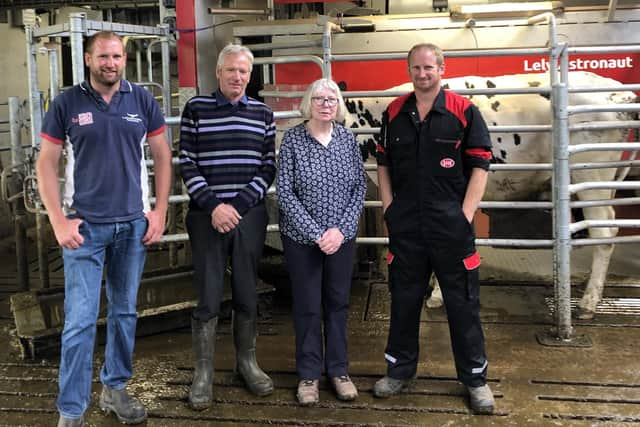Family farm secures bank loan and a carbon count to modernise dairy operation in West Yorkshire
Ken and Lynne Throup, and sons Ian and Martin, run a 240 cows and followers dairy herd on the 460 acres they own at Woofa Bank Farm, Silsden in West Yorkshire and a further 240 acres they rent, with a 400 strong store cattle enterprise and a flock of 850 sheep.
With a small traditional parlour taking them eight hours to milk each day, they needed to move into the future with a new robot milking system and a state-of-the-art building to house it.
Advertisement
Hide AdAdvertisement
Hide AdThe Throups applied successfully for a Rural Payments Agency (RPA) grant towards the costs of a 4-robot Lely system, but turned to their bank to support the much more substantial costs of the new parlour and associated infrastructure they needed to futureproof the farm, including new housing for the sheep enterprise and a calf-rearing shed at Oak Tree Farm.


They approached Virgin Money and also qualified to benefit from its Agri-E fund which encourages farmers to use carbon for an environmentally sustainable future and commercially efficient approach.
To do this, the Throups commissioned a professional carbon audit that measured the carbon performance of every aspect of their farming policy and practice. This has given them a benchmark against which they can measure improvements in carbon emissions across the business – including the effects of their investment.
Ian Throup, who manages the dairy enterprise while his brother Martin looks after the livestock said: “The process of the carbon audit wasn’t difficult but it was very detailed.
Advertisement
Hide AdAdvertisement
Hide Ad“Information had to be gathered and assessed, and the consultants made detailed recommendations on how and where we could make improvements. We’re looking forward to our second audit because we know we are already reducing our carbon footprint as a result of the investment we’ve been able to make.
“The robot milking system is much more flexible, so that’s cutting carbon and increasing productivity, and the changes we’ve been able to make to our infrastructure are making us more efficient and reducing our use of diesel, and most importantly the cows have adapted well to the system.”
Mr Throup said he hoped implementing this approach now would put the farm business ahead of the game as government financial support for farmers is becoming increasingly environment focused and food processing companies are also setting higher environmental standards for the farms they work with.
Mr Thrup added: “The Government’s farming policy is shifting financial support very much towards environmental goals including biodiversity and soil regeneration, and those are key areas of our carbon plans.
Advertisement
Hide AdAdvertisement
Hide Ad"We know that the food processing companies and their customers are setting much more demanding environmental standards for farmers, and we have to be able to show that we’re meeting those standards. We sell all our milk to Dales Dairy and this is becoming a requirement, so we’re very glad that Virgin Money has helped us to be ahead of the game.”
